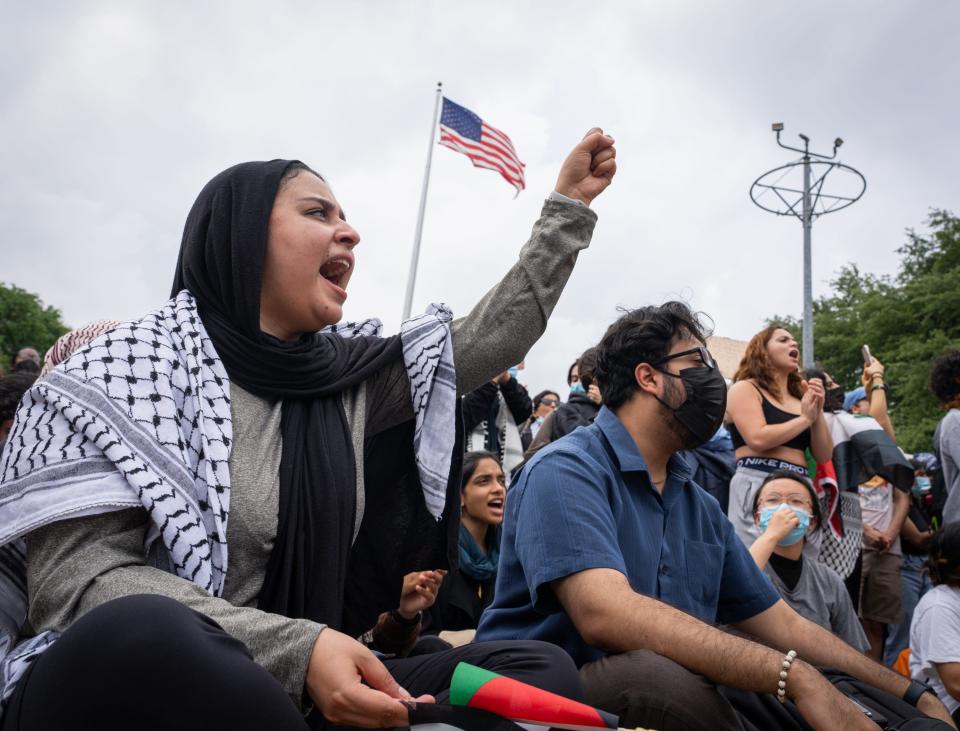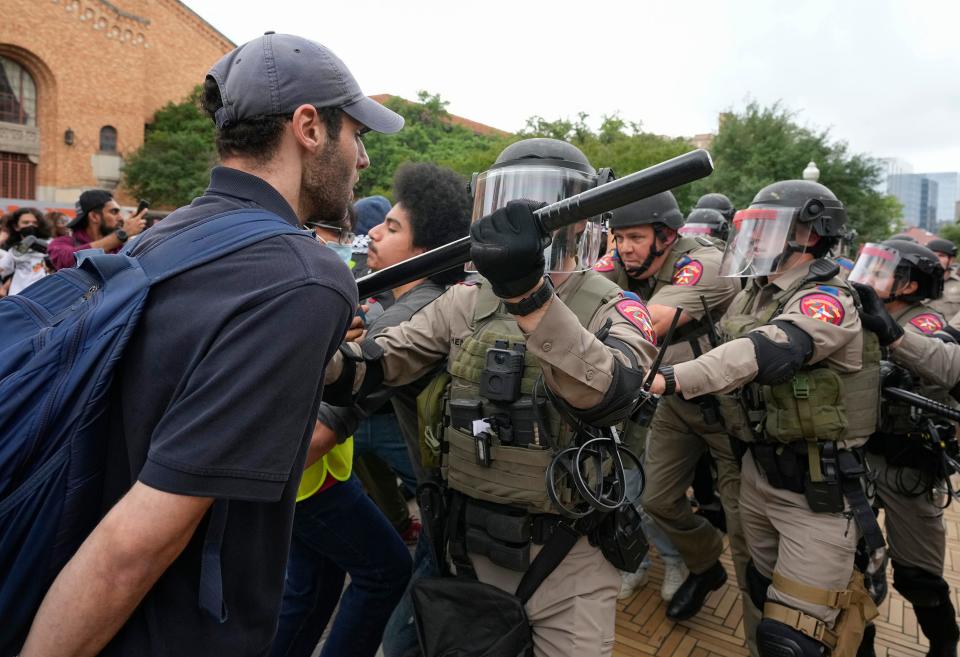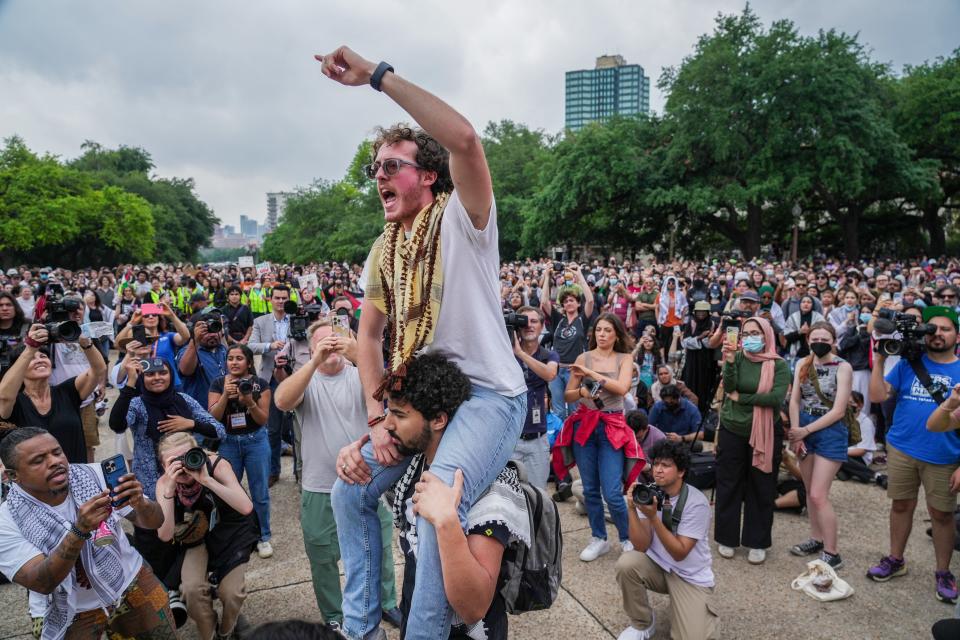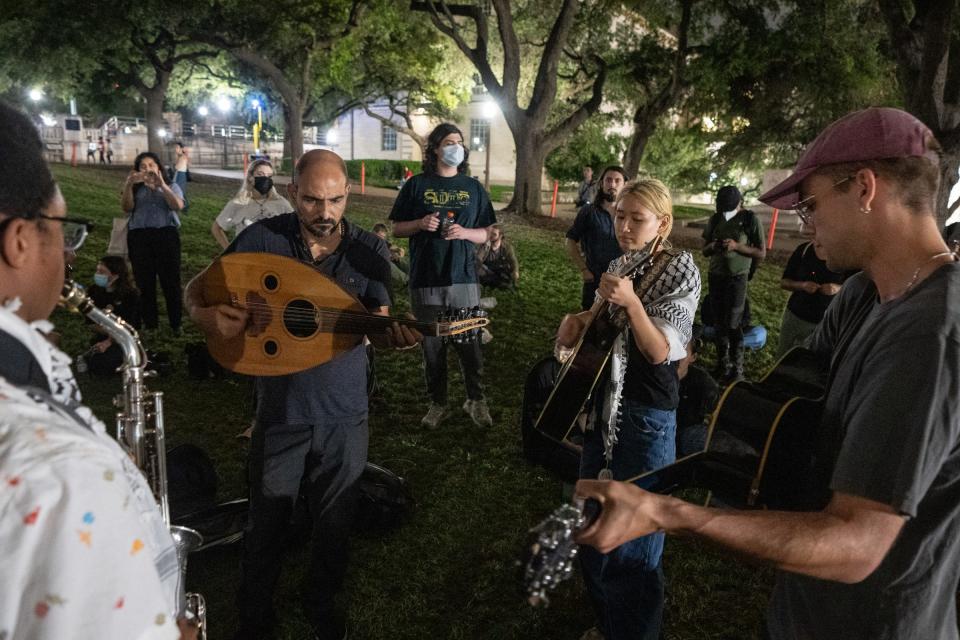Students not currently affected by UT campus ban for people arrested in pro-Palestinian protest
Editor's note: This story has been updated after the University of Texas issued a statement Friday evening clarifying whether students who were arrested in Wednesday's protest are banned from the campus.
People who were arrested during Wednesday's pro-Palestinian protest at the University of Texas are banned from the campus based on existing university policies, but students are not currently affected by a ban.
Printed sheets with a list of rules for participating in a protest on campus were distributed at the university two days after an unauthorized but peaceful protest was aggressively broken up by three separate law enforcement agencies. Fifty-seven people were arrested, according to the Travis County sheriff's office, and about half of those arrested were affiliated with UT.
Individuals cannot "come to campus" if they "were arrested for trespassing on campus previously," according to the sheet. This rule, along with the rest listed on the sheet, existed before the protest, UT spokesperson Mike Rosen said.
Rosen said that this rule holds even if charges are dismissed, as they were for all 57 people who were arrested.

Per the sheet, anyone who is under a criminal trespass warning or an interim disciplinary action preventing the person from entering the property or who has been told to leave due to a rule violation is also not allowed.
But the university issued a statement Friday evening clarifying that no student's access to the campus would change.
As of Friday, no one had been sent a notice of discipline, Rosen said, and therefore, no students arrested this week have any restrictions at this time.
"Historically, UT does not send such notices during finals so it does not risk negatively impacting a student’s performance," Rosen said in a text message.
Twenty-eight students and one staff member were among those arrested Wednesday, according to an internal UT memo obtained Friday by the American-Statesman.
Disciplinary action for employees is addressed through human resources, Rosen said, while people not affiliated with UT are barred outright from the campus. It was not clear how the campus ban will be enforced.
Other university rules bar the refusal to identify oneself during a protest, attempts to camp or sleep on property later than 10 p.m., disrupting operations, using amplified sound, coercing attention or wearing masks.
Students are allowed to assemble peacefully, distribute flyers, have guest speakers or ask staff for assistance.
"Those who violate these or any other rule, policy, or law are subject to immediate removal from campus, conduct charges, and/or arrest," the document said.
The Statesman previously reported that police began making arrests when protesters regathered Wednesday afternoon after initially being told by police to disperse.

Gov. Greg Abbott has said free speech policies should be revised and enforced against pro-Palestinian groups — naming the Palestine Solidarity Committee, the group that organized the protest Wednesday — including expulsion as a way to combat antisemitism on college campuses.
UT on Thursday placed the Palestine Solidarity Committee on an interim suspension, saying the group broke UT rules, but the university would not comment on whether its student members would face disciplinary action.
Students, professors and pro-Palestinian community members gathered on the South Mall in front of the University of Texas Tower again on Friday. Ammer Qaddumi, a UT junior and a leader of the Palestine Solidarity Committee who was among first people arrested at Wednesday’s protest, said the gathering included teach-ins, art and song and was meant to serve as a “safe space” for supporters.
Qaddumi said the circulated sheet of rules was “shameful” as all the arrest charges were determined not to have probable cause.
“There's no reason why these people need to be arrested,” he said. “It's just shameful for the university to be acting in this way.”

Qaddumi said Wednesday’s protest was part of a “pattern of mistreatment” of Palestinians and supporters on campus, referencing an incident in which three people who were not affiliated with UT verbally harassed Palestine Solidarity Committee members at a student meeting in October.
“The only way we can keep each other safe is if we remain united and come together like we did in these last few days,” he said.
Rhiannon Hamam, a UT staff member, told the Statesman that she was arrested Wednesday around 5:30 p.m. when an officer “snatched” her from a line of protesters as they were pushed to the perimeter of the South Mall.
Hamam said she has not been personally contacted or been given notice from the university about the arrest despite the sheet passed around Friday.
“I came to work yesterday, Thursday, to do work. I came to work today, on Friday, to do work,” she said. “I care deeply about this campus. I care deeply about the community that is fostered on this campus. And our movement for Palestinian liberation is strong, and we won't be intimidated.”
Friday's event, where Hamam led a teach-in, followed a gathering on the campus Thursday night that lasted until about 11:30 p.m. About 70 students sang, ate pizza and chanted occasionally. Several police officers were present but did not intervene. The smell of incense lingered in the air, and leaders told students to pick up after themselves when they left.
On Friday, about 50 to 100 students joined the gathering throughout the day. Around 1 p.m., Lutheran Campus Ministry Pastor Brad Fuerst sat with professor Mohammad Mohammad on a bench at the edge of the lawn as pro-Palestinian supporters listened to a teach-in. The men each knew at least one student who was arrested.

"I am for institutions of higher learning that can freely engage in conversation without the threat of police brutality," Fuerst said.
Mohammad, who was often stopped by students saying hello, said he came to the United States because of First Amendment freedoms.
"It is atrocious," Mohammad said of the police intervention Wednesday. "As long as there is no violence, as long as there are no threats, (people should) say what's on their mind."
The demands of pro-Palestinian supporters include a cease-fire in Gaza, UT's divestment from businesses supporting Israel, the resignation of President Jay Hartzell and amnesty for all protesters and the Palestine Solidarity Committee.
Mohammad, who is Palestinian, said he supports students' rights to speak freely.
"Never allow anybody to put you down because you're an Arab or because you're a Christian or a Jew or because you're Muslim," Mohammad said. "The state's job is to protect you, not to tell you what to believe."
This article originally appeared on Austin American-Statesman: Students not currently affected by UT campus ban for people arrested in protest

